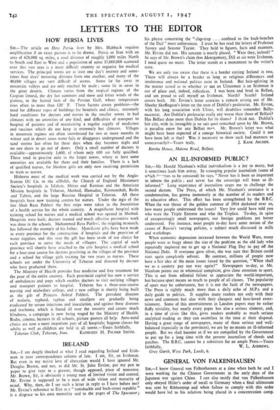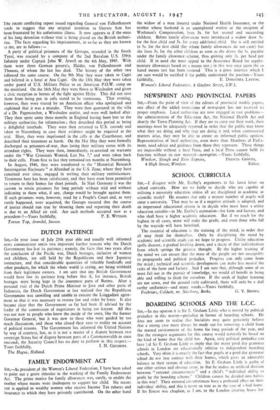GENERAL VON FALKENHAUSEN
knew General von Falkenhausen at a time when both he and I were working for the Chinese Government in the early days of the Japanese, war against China. I can also testify that von Falkenhausen only obeyed Hitler's order of recall to Germany when a final ultimatum was sent by Ribbentrop and when failure to comply with this order would have led to his relatives being placed in a concentration camp.
The recent conflicting report issued regarding General von Falkenhausen tends to suggest that any original intention to liberate him has been frustrated by his unfortunate illness. It now appears as if the onus of his long detention without trial is being placed on the British authori- ties. The facts regarding his imprisonment, in so far as they are known to me, are as follows:—
A party of political prisoners of the Gestapo, stranded in the South Tyrol, was rescued by a company of the 2nd Battalion U.S. 339th Infantry under Captain John W. Atwell on the 4th May, 1945. With them were three German generals, Halder, von Falkenhausen and Thomas, of whom the last has died. The history of the other two followed the same course. On the 9th May they were taken to Capri and billeted in a hotel at Ana Capri. On the 13th May they were taken under guard of U.S. Military Police to an American P.O.W. camp on the mainland. On the 16th May they were flown to Wiesbaden and given a civic reception as heroes of the fight against Hitler. This did not save them from being put in cells stated to be verminous. That evening, however, they were visited by an American officer who apologised and explained that it was a mistake. They were then quartered in the villa of a Dr. Pagenstecher, a Wiesbaden oculist, and were well looked after. They then spent some three months in England having been lent to the military authorities for information ; they described this period as being a delightful interlude. They were then returned to U.S. custody and taken to Nuremberg in case their evidence might be required at the trial. Here, they were imprisoned in the cells at the Courthouse, and described their treatment as harsh. On the 31st May they were formally discharged as prisoners-of-war, thus losing their military status with its attendant rights. They were then, immediately, re-arrested on warrants under the " War Criminals Wanted, List No. 7," and were taken back to their cells. From first to last they remained ten months at Nuremberg.
In August, 1946, they were transferred to the " Historical Research Interrogation Enclosure" at Allendorf in the U.S. Zone, where they have remained ever since, engaged in writing their military reminiscences. Treatment here has been satisfactory, and they have even been permitted to return to their homes for short periods. In Nazi Germany it was the custom to retain prisoners for long periods without trial and without indicating to them what, if any, charge would be brought against them. If such prisoners were, however, tried by a People's Court and, as very rarely happened, were acquitted, the Gestapo ensured that the course of justice should run true by shooting them and reporting their death as due to an Allied air raid. Are such methods accepted now as a



































 Previous page
Previous page